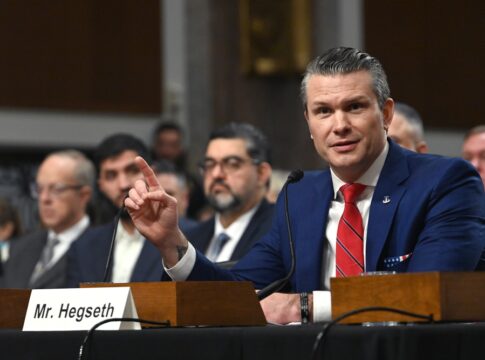US-China tensions have escalated dramatically at the Shangri-La Dialogue, with both nations trading sharp accusations that threaten to further destabilize their already fragile relationship. This high-profile diplomatic clash comes amid ongoing disputes over Taiwan’s status and with both powers locked in a trade war. Could the tensions from Taiwan boil over into Tariff negotiations?
Diplomatic Clash at Shangri-La
US Defense Secretary Pete Hegseth and Chinese officials are locked in a heated war of words that threatens to deepen the rift between the world’s two largest economies. China’s Foreign Ministry swiftly condemned Hegseth’s characterization of Beijing as a destabilizing force in the Indo-Pacific, calling his remarks a dangerous provocation rooted in outdated Cold War thinking.
Speaking at the prestigious Shangri-La security forum in Singapore, Hegseth issued stark warnings about China’s regional ambitions and military actions toward Taiwan. The Defense Secretary emphasized that while America doesn’t seek regime change or war with China, it remains committed to preventing Chinese domination of US allies and partners in the region.
“We do not seek conflict with communist China. We will not instigate nor seek to subjugate or humiliate” , remarks by Secretary of Defense Pete Hegseth at the 2025 Shangri-La Dialogue in Singapore.pic.twitter.com/Ij9fYO7PJJ
“President Trump and the American people have immense…
— Sri Lanka Tweet 🇱🇰 (@SriLankaTweet) June 1, 2025
Taiwan Remains Flashpoint
Taiwan continues to be the most dangerous flashpoint in US-China relations, with Beijing considering the self-governing island an inseparable part of Chinese territory. Chinese Defense Ministry spokesperson Zhang Xiaogang accused Hegseth of provocatively distorting China’s policy positions, insisting that Taiwan remains an internal affair that brooks no foreign interference.
The United States maintains a deliberately ambiguous policy toward Taiwan, withholding formal diplomatic recognition while simultaneously providing substantial military support for the island’s self-defense capabilities. Both China and Taiwan have increased their military presence in the contested South China Sea, raising concerns about potential miscalculations that could trigger wider conflict.
U.S. Secretary of Defense Pete Hegseth has addressed the Shangri-La Dialogue in Singapore, saying China poses an imminent military threat and calling on U.S. allies in Asia to up their defense spending. pic.twitter.com/vFSWk2hknI
— TaiwanPlus News (@taiwanplusnews) May 31, 2025
Economic Strains Compound Tensions
The diplomatic confrontation unfolds against a backdrop of worsening economic relations, with the trade war initiated during the first Trump administration continuing unabated. Recent efforts to adjust tariffs between the two economic giants have stalled, doing little to ease the fundamental tensions driving the competition.
President Trump has repeatedly accused China of violating trade agreements, while Beijing has criticized American export controls targeting Chinese access to advanced semiconductors. Treasury Secretary Scott Bessent expressed optimism about resolving trade issues between President Trump and Chinese President Xi Jinping, though concrete progress remains elusive.
Secretary of State Marco Rubio has announced plans to revoke visas for Chinese students connected to the Chinese Communist Party or studying in critical technological fields. This move signals a hardening American stance on technological competition with China, reflecting growing concerns about intellectual property protection and national security implications of academic exchanges.
The Chinese Foreign Ministry responded by accusing the United States of deploying offensive weaponry throughout the South China Sea. Beijing maintains that American military activities, not Chinese policies, are the true source of regional instability and rising tensions across the Asia-Pacific region.
Hegseth has also signaled that Indo-Pacific allies should expect tough conversations about contributing more to their defense. This stance aligns with broader Trump administration policies emphasizing burden-sharing among allies and reducing American overseas commitments where partners can take greater responsibility.


